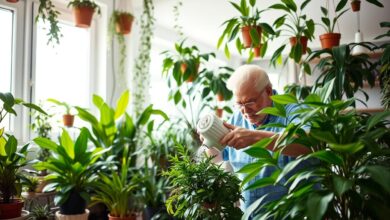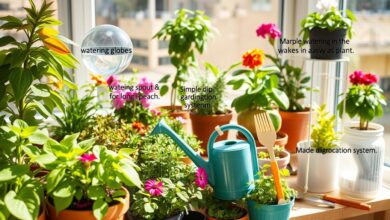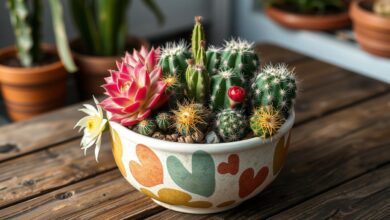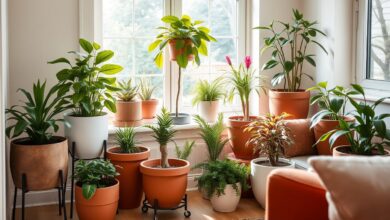Beginner Gardening Tips for Seniors: Get Started!
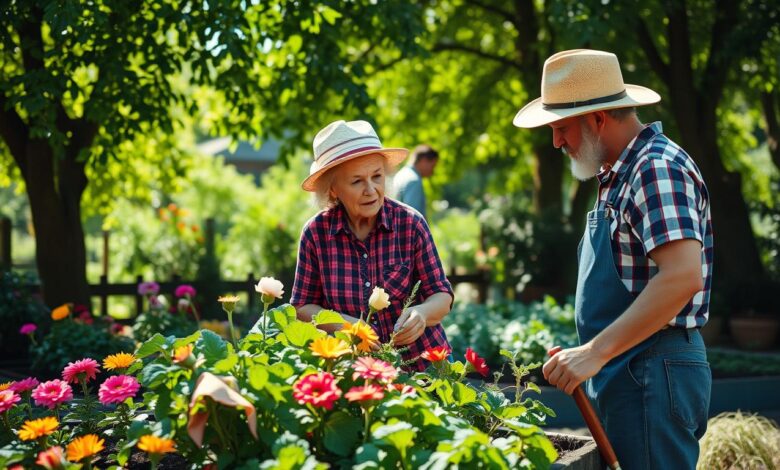
No matter your age or the color of your thumb, gardening is a wonderful hobby that provides numerous benefits for mind, body, and spirit. Whether you’ve planted a thousand seeds and grown all your own food, or you’ve never touched a trowel, there are ways to make growing your own flowers and vegetables simple and attainable. This article will provide beginner gardening tips for seniors to help you enjoy a fulfilling hobby.
Table of Contents
Key Takeaways
- Embrace low-maintenance gardening with perennials and native plants
- Prioritize safety and comfort by staying hydrated and taking breaks
- Adapt your garden for easy accessibility with wide paths and ergonomic tools
- Incorporate seating and irrigation systems to minimize physical strain
- Start small and manageable, then grow your garden at your own pace
Embrace Easy-Care Gardening
As we age, it becomes increasingly important to choose gardening options that are low-maintenance and easy to manage. Fortunately, there are several strategies seniors can employ to create a beautiful and enjoyable garden with minimal effort.
Choose Low-Maintenance Plants
While annuals may be tempting with their vibrant blooms, they often require more frequent watering, deadheading, and replanting each year. Instead, opt for perennials and native species that are well-suited to your climate and require less hands-on attention. Gaillardia, or blanket flower, and oak leaf hydrangeas are just a few examples of low-maintenance plants that will return year after year with minimal care.
Opt for Raised Beds and Containers
Bending and stooping can be challenging for seniors, so consider incorporating raised garden beds or container gardening into your outdoor space. Raised beds elevate the planting area, reducing the need to bend down, while containers allow you to bring the garden closer to your sitting or standing height. These solutions not only make gardening more accessible but also allow you to better manage the soil and watering needs.
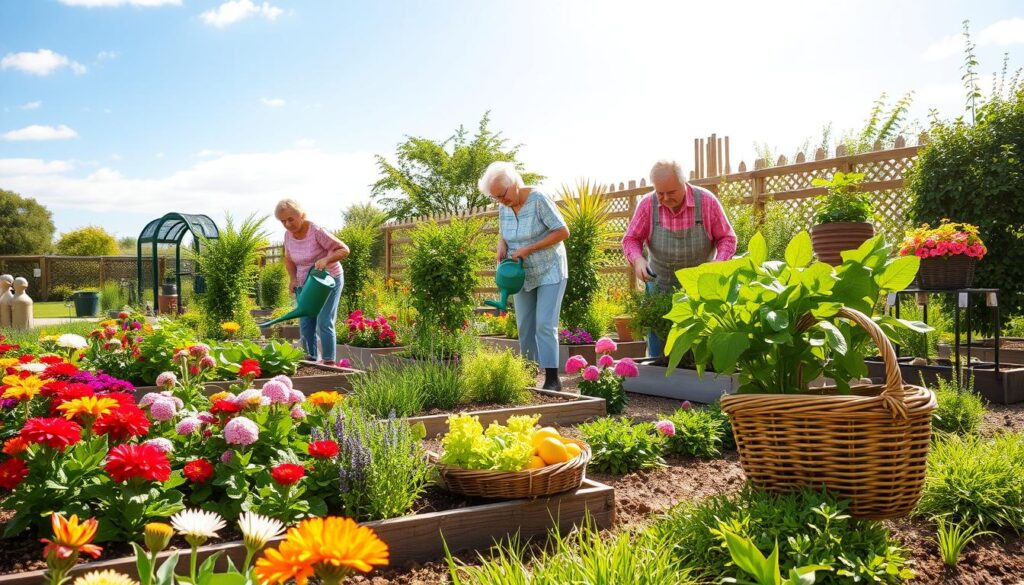
“The benefits of gardening for seniors include physical activity, which can become more challenging as one ages. Prioritizing garden areas can help seniors manage their time efficiently based on their physical abilities and budget.”
By embracing easy-care gardening strategies, such as selecting low-maintenance plants and opting for raised beds or containers, you can create a thriving outdoor space that requires less physical effort and still brings the joy of gardening into your life.
Prioritize Safety and Comfort
Gardening can be a rewarding hobby for seniors, but it’s crucial to prioritize safety and comfort. By incorporating a few simple precautions, you can ensure a safe and enjoyable gardening experience.
Wear Proper Clothing
Protect yourself from the elements by wearing closed-toe shoes, gardening gloves, and a wide-brimmed hat. This will shield you from the sun’s harmful rays and prevent injuries from sharp tools or thorny plants. Wearing the right attire can enhance your senior gardening safety and comfort.
Stay Hydrated
Gardening can be physically demanding, especially in warm weather. Keep a water bottle close by and take frequent breaks to stay hydrated. Proper hydration can help prevent fatigue and overexertion, allowing you to garden for longer without compromising your health. Staying hydrated is essential for senior gardeners to maintain their energy and prevent dehydration.
“Proper clothing and hydration can help ensure a safe and enjoyable gardening experience for seniors.”
By prioritizing safety and comfort, you can make the most of your gardening activities and continue to reap the benefits of this rewarding hobby well into your golden years.
Adapt Your Garden for Accessibility
When it comes to gardening, accessibility is key, especially for senior gardeners. Uneven walkways and hard-to-navigate paths can pose serious challenges for those using mobility aids like wheelchairs or walkers. To create a truly accessible gardening experience, focus on wheelchair-friendly gardens for the elderly by ensuring your garden has wide, level pathways that accommodate your needs.
Create Wide, Level Pathways
Navigating an uneven or cluttered garden can be a recipe for disaster, increasing the risk of falls and injuries. To make your garden safer and more accessible for senior gardeners, consider the following tips:
- Establish wide, level pathways at least 36 inches wide to allow for easy movement of mobility aids.
- Opt for smooth, non-slip surfaces like paving stones or decomposed granite to prevent tripping hazards.
- Eliminate steps, slopes, or sudden changes in elevation that could trip up seniors.
- Keep pathways free of debris, hoses, or other obstacles that could cause a fall.
By creating pathways for senior gardeners, you’ll cultivate a wheelchair-friendly garden that allows seniors to explore their green space with confidence and ease.
“Gardening offers health benefits for seniors, with routine activity reducing the risk of stroke and promoting a longer, healthier life.”
With a few simple modifications, you can transform your garden into a safe, inviting space that caters to the unique needs of older adults. By prioritizing accessibility, you’ll empower senior gardeners to enjoy the therapeutic and physical benefits of their green oasis.
Invest in Ergonomic Tools
When it comes to gardening, not all tools are created equal. It’s important to carefully select tools that are designed with the unique needs of senior gardeners in mind. By investing in ergonomic gardening tools, you can reduce strain, increase comfort, and make the most of your time spent tending to your outdoor oasis.
Look for lightweight, well-designed tools with large grips and long handles to minimize the physical exertion required. These features can make a significant difference in reducing fatigue and discomfort, allowing you to garden for longer periods without feeling the toll on your body.
- Opt for tools like garden forks and the Cape Cod Weeder, which are specifically engineered for easier use by older adults.
- Prioritize ergonomic gardening tools for the elderly that prioritize your comfort and ease of use.
- Incorporate lightweight tools for senior gardeners to avoid unnecessary strain on your muscles and joints.
Adapting your tool selection is a simple yet impactful way to make gardening more accessible and enjoyable as you grow older. By investing in the right gardening tools for seniors, you can continue to nurture your green thumb and reap the many health benefits that gardening provides.
“Gardening is a great way for seniors to stay active, but it’s important to use the right tools to make the experience comfortable and safe,” says Barb Kreski, director of horticulture services at the Chicago Botanic Garden.
Add Seating and Benches
Gardening can be a rewarding activity for seniors, but it’s important to prioritize comfort and accessibility. One way to make your garden more senior-friendly is by adding seating options, such as garden benches or stools.
When choosing garden benches for seniors, look for models that are the appropriate size for you, lightweight enough to move with ease, and sturdy enough to withstand the elements. A comfortable, well-placed bench or stool can provide a resting spot, allowing you to take breaks and savor your time in the garden.
- Opt for benches with ergonomic features, such as backrests and armrests, to provide extra support and reduce strain.
- Consider placing benches or stools near your raised garden beds or other high-traffic areas, making it easy to sit and tend to your plants.
- Incorporate seating for elderly gardeners in shady spots throughout your garden, encouraging you to spend more time outdoors and enjoy the sights and sounds of your personal oasis.
By incorporating comfortable seating for your garden, you can make your outdoor space more accessible and enjoyable for senior gardeners, allowing you to fully immerse yourself in the joys of comfortable gardening for seniors.
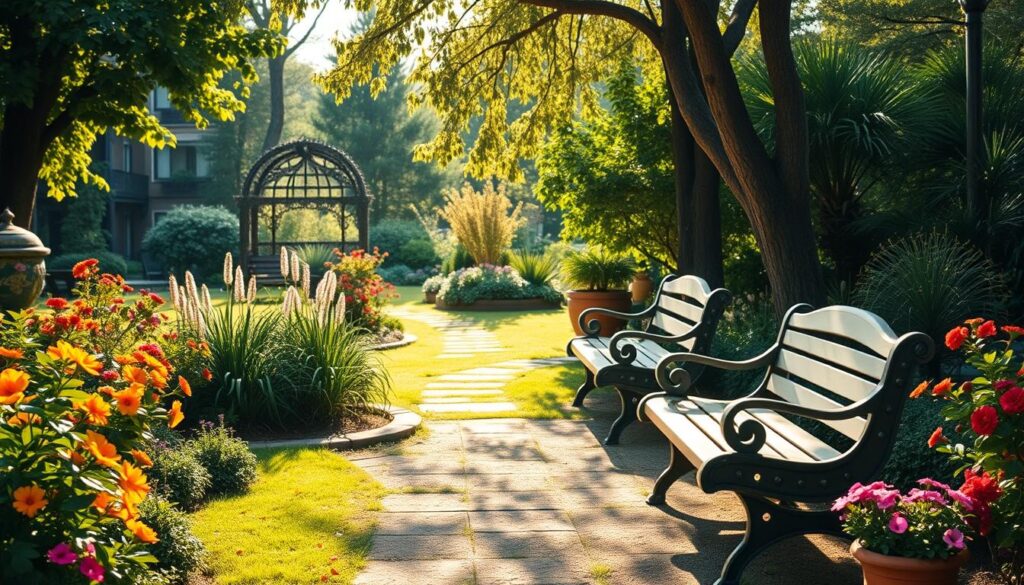
Incorporate Irrigation Systems
For senior gardeners, setting up an efficient irrigation system can be a game-changer. While it may require a bit more initial effort, the benefits of an automated watering solution are well worth it, especially during the hot summer months. By installing soaker hoses or drip irrigation, senior gardeners can minimize the need to carry heavy watering cans, reducing strain and effort.
Soaker hoses, for instance, are dotted with tiny pores along their length that slowly and gently deliver water directly to the roots of your plants. This method ensures efficient water usage and eliminates the need for manual watering. Drip irrigation systems work on a similar principle, providing a steady, controlled flow of water to the specific areas that need it most.
Efficient Watering Solutions for Senior Gardeners
- Soaker hoses: Deliver water slowly and directly to plant roots, reducing evaporation.
- Drip irrigation systems: Provide a targeted, controlled flow of water to specific areas.
- Sprinkler systems: Offer coverage for larger garden areas, with adjustable spray patterns.
- Self-watering containers: Feature built-in reservoir systems that automatically water plants as needed.
- Rain barrels: Collect and store rainwater for later use, reducing the need for municipal water.
| Irrigation System | Benefits for Senior Gardeners |
|---|---|
| Soaker Hoses | Minimize the need for heavy watering cans, reduce strain and effort. |
| Drip Irrigation | Provide targeted, controlled water flow to plants, improving efficiency. |
| Sprinkler Systems | Cover larger garden areas with adjustable spray patterns for convenience. |
| Self-Watering Containers | Automatically water plants, reducing the need for manual watering. |
| Rain Barrels | Collect rainwater for later use, reducing the reliance on municipal water sources. |
By incorporating these irrigation systems for senior gardeners, older adults can enjoy their gardens with reduced watering effort and low-effort watering solutions, allowing them to focus on the joy and relaxation of gardening.
Mulch for Moisture Retention
As senior gardeners, we know the importance of keeping our gardens well-hydrated, especially in hot, dry climates. That’s where mulch comes in – it’s a game-changer when it comes to moisture retention. By applying a thick layer of organic mulch around your plants, you can significantly reduce the amount of water needed to keep your garden thriving.
Mulching for senior gardeners is a smart strategy for low-maintenance gardening. It cuts down on weeds, which compete with your plants for precious water, and helps the soil retain moisture, reducing the need for frequent watering. This makes moisture-retaining gardens for the elderly much easier to manage, freeing up time and energy for other gardening tasks.
When it comes to choosing the right mulch, there are several options to consider. Organic mulches like shredded leaves, straw, or aged compost not only help retain moisture but also enrich the soil as they break down. Inorganic options like gravel or plastic can also be effective, but be mindful of their impact on soil health and water penetration.
| Mulch Type | Benefits | Considerations |
|---|---|---|
| Shredded Leaves | Improves soil structure, adds nutrients | Requires 9 months of aging to avoid inhibiting plant growth |
| Straw | Excellent moisture retention, cool-weather crops | Can harbor pests if not properly dried |
| Aged Compost | Enriches soil, improves water-holding capacity | May need to be reapplied more frequently |
| Plastic Mulch | Suppresses weeds, retains moisture | Can prevent rainwater penetration, may increase soil temperature |
No matter which mulch you choose, be sure to apply it in a thick, even layer around your plants, leaving a bit of space between the mulch and the stems to prevent rot and disease. With the right mulching for senior gardeners, you can create a moisture-retaining garden for the elderly that requires minimal effort to maintain.
“Mulching can increase yields by as much as 30 percent according to university field tests.”
beginner gardening tips for seniors
As we grow older, the joys of gardening can become increasingly challenging. However, with the right approach, seniors can still reap the numerous benefits of this rewarding hobby. In this section, we’ll explore a variety of beginner gardening tips for seniors to help make growing your own flowers and vegetables simple and attainable.
One key strategy is to embrace easy-care gardening. Choose low-maintenance plants like perennials and native species that require less watering and pruning. Opt for raised beds or container gardening to minimize bending and stooping, making your garden more accessible. A study published by the British Journal of Sports Medicine revealed that those who engage in routine physical activity, such as gardening, can reduce the risk of stroke and promote a longer, healthier life.
Prioritizing safety and comfort is also essential. Wear proper clothing like closed-toe shoes, gloves, and sun protection. Stay hydrated and take frequent breaks to avoid fatigue and overexertion. The Buehler Enabling Garden at the Chicago Botanic Garden is designed to inspire older gardeners and people with physical limitations, incorporating features like pulley systems for hanging baskets and levers on gates and faucets instead of knobs.
Investing in ergonomic tools can make a significant difference in your gardening experience. Look for lightweight, well-designed tools with large grips and long handles to reduce strain. As 72-year-old gardener Dean Failor from Oregon shared, he uses a garden fork instead of a spade for lighter tasks and a Cape Cod Weeder for weeding, finding them more efficient.
Remember, gardening for the elderly is about finding joy in the process, not perfection. Focus on quality over quantity, and don’t hesitate to ask for help with more strenuous tasks. With these easy gardening ideas for older adults, you can cultivate a fulfilling and accessible garden that nourishes your mind, body, and spirit.
“Gardening provides Vitamin D benefits, fresh produce, exercise, and mental stimulation for older individuals.”
Embrace Vertical Gardening
If you’re a senior gardener who’s had a large garden in the past, transitioning to a smaller plot or container gardening can be challenging. But fear not, vertical gardening offers a fantastic solution that allows you to maximize your available space while also reducing the need to bend down. By utilizing grow towers, wall planters, or trellises, you can grow your plants up rather than out, making gardening more accessible and comfortable for seniors.
Maximize Space and Minimize Bending
Vertical gardening is a game-changer for seniors who want to enjoy the benefits of gardening without the strain of constant bending and stooping. These space-saving techniques enable you to grow a variety of plants, from herbs and vegetables to flowers, in a compact footprint. Plus, you’ll be able to tend to your garden with less physical effort, allowing you to continue pursuing your green-thumbed passions for years to come.
- Utilize grow towers to cultivate a range of plants in a small vertical space
- Explore wall planters that can be mounted at eye level or slightly above, reducing the need to bend down
- Incorporate trellises and other vertical structures to support the growth of vining plants, such as tomatoes, cucumbers, and climbing beans
By embracing vertical gardening, you can create a beautiful, thriving garden that’s tailored to your needs as a senior. Enjoy the therapeutic benefits of gardening while minimizing physical strain and maximizing your available space.
“Gardening is a constant exercise in problem-solving, and it’s one that I find particularly soothing.” – Peg Bracken
As you embark on your vertical gardening journey, remember to choose low-maintenance plants, utilize ergonomic tools, and take regular breaks to ensure your gardening experience remains both enjoyable and sustainable. With a little creativity and the right adaptations, you can continue to nurture your green thumb well into your golden years.
Seek Help When Needed
Gardening can be a delightful hobby, but it’s important to recognize when you may need a bit of assistance. As a senior gardener, don’t hesitate to reach out to family members, friends, or even hire help for more strenuous tasks. This can help you focus on the aspects of gardening you enjoy most without overexerting yourself.
While being completely self-sufficient can have its rewards, a helping hand at the right time can make gardening more enjoyable for seniors. Consider delegating tasks like heavy lifting, extensive weeding, or difficult pruning to trusted individuals who can lend a hand. This not only ensures your safety but also allows you to savor the gardening experience rather than feeling overwhelmed.
If your budget permits, hiring a professional gardener or landscaper can be a game-changer. They can take care of the more physically demanding chores, leaving you to focus on the creative and rewarding elements of gardening. Getting help with gardening for seniors can be a wise investment in your health and happiness.
Remember, there’s no shame in asking for help. Delegating tasks for elderly gardeners can help you maintain your passion for gardening while ensuring your safety and well-being. So, don’t hesitate to reach out to your support network or consider hiring assistance for senior gardeners when needed.
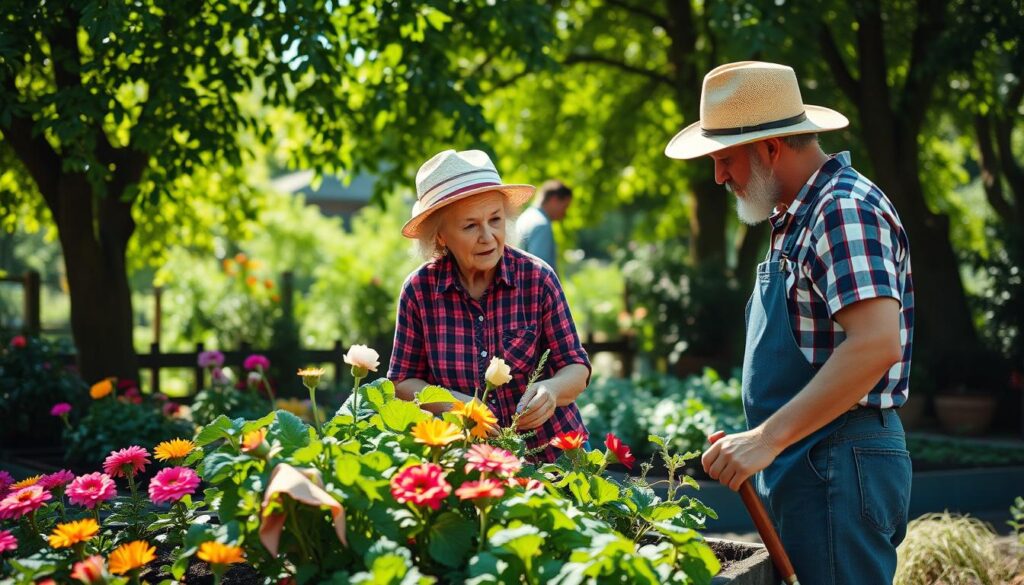
“You’re never too old to learn a new skill, and gardening can be a wonderfully rewarding hobby for seniors. But it’s important to know when to ask for assistance to ensure your safety and enjoyment.”
Adjust Your Mindset
When it comes to gardening as a senior, it’s important to adjust your mindset and focus on quality over quantity. Many beginner gardeners, including seniors, often fall into the trap of thinking that more is better – more plants, more flowers, more vegetables. However, this approach can quickly become overwhelming and lead to frustration.
As one senior gardener shared, her biggest struggle was getting over the idea that a larger garden equates to better results. “I was challenging myself to really savor that single pot of flowers or that single bloom in the garden,” she explained. “It wasn’t easy, but concentrating on what I had, instead of what I didn’t, made life a lot easier.”
Embracing a mindset that prioritizes quality over quantity and savoring the process of gardening, rather than striving for a large-scale garden, can make the activity much more enjoyable and sustainable for seniors. By focusing on the simple pleasures of tending to a few well-cared-for plants, you can find a sense of fulfillment and relaxation in the garden, rather than feeling overwhelmed by the pressure to create a sprawling oasis.
“Adjusting your mindset to focus on quality over quantity and savoring the process rather than striving for a large-scale garden can help make gardening more enjoyable for seniors.”
Gardening is a wonderful way for seniors to stay active, connect with nature, and cultivate a positive mindset. By adopting a gardening mindset for seniors that emphasizes quality over quantity in senior gardening and savoring the process of gardening for the elderly, you can find immense joy and fulfillment in this rewarding hobby.
Choose the Right Location
When planning your garden, be sure to choose a location that is convenient and accessible for you as a senior. Situate your garden in a spot that is close to your home, with wide, level pathways to make it easy to get to and navigate. This can help reduce the effort required to tend to your plants and ensure you can continue to enjoy gardening for older adults as you get older.
Gardening is an enjoyable form of mild-to-moderate exercise for seniors, aiding them in staying active, mentally stimulated, and physically fit. Seniors who engage in gardening experience reduced stress levels, improved well-being, and have access to nutritious home-grown herbs, fruits, and vegetables. By choosing the right location of gardens for seniors, you can make the most of this rewarding hobby without compromising your comfort or safety.
Prioritize Accessibility and Convenience
- Situate your garden near your home for easy access.
- Create wide, level paths to accommodate mobility aids like wheelchairs or walkers.
- Ensure the garden is well-lit to prevent falls and injuries.
- Provide comfortable seating areas throughout the garden for rest breaks.
By making your garden accessible garden placement for the elderly, you can enjoy the benefits of gardening while minimizing physical strain and safety concerns. Start small and gradually expand your garden as you become more comfortable and confident in your abilities.
| Key Considerations for Seniors | Benefits |
|---|---|
| Convenient location near home | Reduces effort and increases accessibility |
| Wide, level pathways | Accommodates mobility aids and prevents falls |
| Ample seating areas | Allows for rest and enjoyment of the garden |
| Well-lit garden space | Enhances safety and visibility |
“Gardening is a rewarding activity that can greatly benefit seniors, but it’s important to prioritize accessibility and convenience to make the most of this hobby.”
Start Small and Manageable
As seniors interested in gardening for seniors, it’s important to start with a manageable gardens for the elderly that fits your abilities and lifestyle. Avoid the temptation to tackle a large, high-maintenance low-maintenance gardening for older adults that can quickly become overwhelming. Instead, focus on creating a smaller, more manageable space that you can easily care for on a regular basis.
One effective strategy is to begin with a simple manageable gardens for the elderly, such as a few raised garden beds or a selection of container plantings. This allows you to test your green thumb and gradually expand your gardening for seniors as you gain confidence and experience. Plus, smaller gardens require less physical exertion, reducing the risk of fatigue or injury.
- Opt for low-maintenance gardening for older adults like perennials and native species that require less watering and pruning.
- Choose manageable gardens for the elderly like raised beds or container gardens to minimize bending and stooping.
- Utilize vertical gardening techniques, such as trellises or grow towers, to maximize your growing space without added physical strain.
Remember, the key is to start small, stay focused, and allow your gardening for seniors to evolve at a pace that feels comfortable and sustainable for you. With a little planning and a manageable approach, you can enjoy the benefits of low-maintenance gardening for older adults for years to come.
“Gardening is not just about the end result, but the journey itself. Start small, find joy in the process, and let your garden grow at a pace that works for you.”
Conclusion
This article has provided a wealth of beginner gardening tips for seniors, empowering them to embrace the joys and benefits of this fulfilling hobby. From easy-care gardening with low-maintenance plants to prioritizing safety and comfort, the insights shared here can help senior gardeners overcome common challenges and nurture their green thumbs with confidence.
By adapting your garden for accessibility, investing in ergonomic tools, and incorporating thoughtful features like seating and irrigation systems, you can create a thriving oasis tailored to your needs. Don’t hesitate to seek help when necessary, and focus on quality over quantity to savor the process rather than strive for a large-scale garden.
Gardening offers a wealth of physical, mental, and social benefits for older adults. Studies have shown that engaging in this activity can reduce the risk of dementia by 36%, spike serotonin levels, and act as a natural stress reliever. Whether you choose to cultivate a raised bed, container garden, or explore vertical gardening, the rewards of beginner gardening for seniors, gardening for the elderly, and easy gardening for older adults are truly bountiful.
“Gardening is a way to create a living, breathing sanctuary — a place where one can experience the joy of nurturing life and the fulfillment of watching something grow.” – Unknown
As you embark on your gardening journey, remember to start small, adjust your mindset, and enjoy the process. With the right approach, senior gardeners can continue to reap the abundant rewards of this rewarding hobby for years to come.
| Benefits of Gardening for Seniors | Statistics |
|---|---|
| Reduced Dementia Risk | 36% lower chance of developing dementia later in life |
| Stress Reduction | Decreases cortisol levels and blood pressure |
| Improved Mental Well-being | Spikes serotonin levels and sharpens mental acuity |
| Enhanced Physical Activity | Boosts physical activity and disease prevention |
| Social Engagement | Thriving hubs for social interaction in assisted living communities |
Additional Resources
For more information and inspiration on beginner gardening for seniors, check out the following resources:
Gardening for the Elderly by the American Horticultural Therapy Association provides practical tips and advice for older adults looking to maintain an active, rewarding gardening lifestyle. The publication covers topics like ergonomic tool selection, raised bed gardening, and transitioning to low-maintenance landscaping.
The National Gardening Association offers a wealth of resources for senior gardeners, including articles on easy-care plants, gardening with limited mobility, and safe gardening practices. Their online community forum also allows older gardeners to connect and share experiences.
For those interested in resources for resources for senior gardeners, the Gardening Matters website features a comprehensive guide on gardening for the elderly, covering topics like container gardening, accessible garden design, and ergonomic tools. The site also includes a list of local organizations that provide services and support for senior gardeners.
FAQ
What are some low-maintenance plants that are good for senior gardeners?
Perennials like gaillardia (blanket flower) and native species that require less watering and pruning are great options for senior gardeners. Shrubs like oak leaf hydrangeas also thrive with minimal maintenance.
How can raised beds or container gardening help make gardening more accessible for seniors?
Raised beds and container gardening can minimize bending and stooping, making gardening more comfortable for seniors. These options allow seniors to garden at a more ergonomic height.
What safety and comfort tips should seniors consider when gardening?
Seniors should wear proper clothing like closed-toe shoes, gloves, and sun protection. Staying hydrated and taking frequent breaks can help prevent fatigue and overexertion.
How can seniors make their gardens more accessible?
Creating wide, level pathways to accommodate mobility aids like wheelchairs or walkers can help make the garden more accessible for seniors.
What features should seniors look for in gardening tools?
Lightweight, well-designed tools with large grips and long handles can help reduce strain and make gardening more comfortable for seniors.
How can seniors incorporate seating and benches into their gardens?
Garden benches or other seating options that are the appropriate size, lightweight, and sturdy can provide a comfortable place for seniors to rest and work in the garden.
What are the benefits of using an irrigation system for senior gardeners?
Irrigation systems like soaker hoses or drip irrigation can minimize the need for seniors to carry heavy watering cans, reducing strain and effort.
How can mulch help make gardening easier for seniors?
Mulch can help cut down on weeds and save on water, creating a more low-maintenance garden that is easier for seniors to care for.
How can vertical gardening benefit senior gardeners?
Vertical gardening, using grow towers, wall planters, or trellises, can help seniors maximize their available space while also reducing the need to bend down.
When should seniors consider seeking help with their gardens?
Seniors should not hesitate to ask family members, friends, or hire help for more strenuous gardening tasks to ensure they can continue to enjoy the hobby without overexerting themselves.
How can seniors adjust their mindset to make gardening more enjoyable?
Focusing on quality over quantity and savoring the process rather than striving for a large-scale garden can help make gardening more enjoyable for seniors.
Where should seniors locate their garden for maximum accessibility?
Situating the garden in a convenient, accessible spot, preferably close to the home, can help reduce the effort required to tend to the plants.
How can seniors start with a manageable garden size?
Focusing on a smaller, more manageable garden space that is easy to care for can help ensure seniors can continue to enjoy the hobby without feeling overwhelmed or overexerted.

